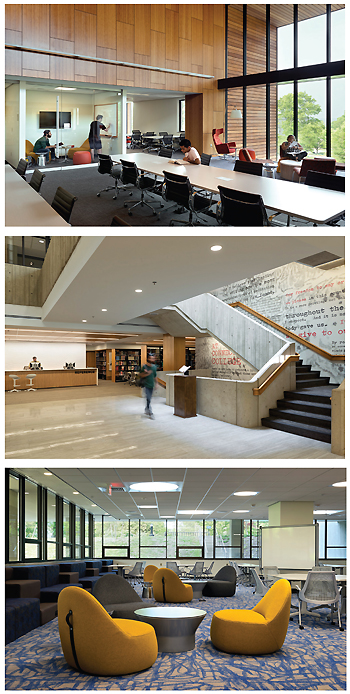Charles E. Shain Library | New Landmark Libraries 2016 Winner
Embrace, Expand, & Enhance
Charles E. Shain Library | Connecticut College | New London ARCHITECT Schwartz/Silver Architects
The renovation of the Charles E. Shain Library at Connecticut College in New London builds on a strong foundation of the past to nurture a new generation of students. Schwartz/Silver Architects was tasked with working under an extremely tight budget for the project and excelled in every way, completing the work under budget and ahead of schedule. Through judicious deselection, the use of compact shelving, and shifting and customizing the footprint of the stacks, the library was able to produce more study and collaborative spaces and keep the collection on-site. Moving people-centric spaces to the perimeter of the building gave 80 percent of all study seats access to natural light in close proximity to exterior views. Thoughtful repurposing and creative reorganization epitomizes this project.

HISTORY REBORN A Brutalist icon (above) gets lightened up but stays in touch with its roots. (Top-bottom) The Shain reading room, renovated staircase, and tech commons. Photos ©Paul Burk Photography
Create new connections
A prime example of Brutalist architecture, the Shain Library was designed with a sunken waterless moat, narrow slit windows, and heavy concrete façades, all contributing to a sense of aloofness and inaccessibility. Rather than minimizing the design, the architects and library staff chose to celebrate and enhance it. They developed a new palette for the interior—including finishes, colors, and furnishings—to complement the original 1974 aesthetic. Students can now choose from a variety of ergonomic seating. The renovation connects the library to the campus both physically and visually. Designers created new green space by filling in the moat and bringing more natural light into the interior by combining and enlarging the slit windows. Adding a raised clerestory structure over the entry to the building gives the library a double-height reading room. All of these changes add to a sense of vitality and promise for the successful future of the faculty, students, and staff.
It was especially challenging for the design team to update conduit and mechanical functions because of the building’s cast-in-place concrete frame. The team got innovative with flat wire, using it to provide more power to new floor boxes, avoiding damage to the slabs and floor finishes. Now, there is power within five feet of every study seat in the library. In order to soften and complement the concrete interior, bamboo veneer paneling (a rapidly renewing material) covers the walls and ceiling of the reading room on the third floor. The goal of preservation had an additional environmental benefit: nearly all debris from the renovation was diverted from landfills. The renovation gave designers the opportunity to abate and remove toxic materials such as vinyl asbestos tiles and replace them with low-VOC and high-recycled-content materials.
V I T A L S OPENED March 2015 TOTAL SQUARE FEET 101,000 COST $9.8 million
Since the team knew it could not create a new stair and stay within budget, it focused instead on transforming the entrance with a floor to ceiling glass entryway and a new piece of art to acknowledge the intellectual impact of the library. Situated behind the stair is a custom wall graphic that incorporates images of text from the dedication of the original 1974 building, written by Kurt Vonnegut, with hyperpixelated images of the library’s Chinese scroll collection. This art serves to commemorate the collection and the original structure while adding whimsy and a sense of play.
Embrace the digital
The renovation also recognizes that 21st-century learning comprises quiet study, collaboration, and the use of digital tools to explore and express the academic experience. Two new reading rooms were created, and the renovation also opened up the main floor to offer students a new 24-hour study space and café. This area includes a new Americans with Disabilities Act (ADA)–compliant all-gender restroom. Students have control over the Technology Commons on the lowest level. It features a visualization wall that allows students and visitors to view their projects on the 24-panel interactive screen. The screen can transmit information simultaneously from multiple devices, including mobile phones.
While the documents submitted for this competition repeatedly describe this renovation as “modest,” the judges think it is outstanding. It illustrates what creativity can emerge from careful planning, consideration, thrift, and a strong sense of preservation. In recognition of its excellence, the Shain Library received the award for excellence in library interior design from the American Library Association and the International Interior Design Association. The renovation of the Shain Library creates opportunity from history and enables the future through innovative design solutions focused on maximizing opportunities to collaborate, access inspiration, and playfully engage with information.
 | Overview: Learning Life Cycle |
| 2016 WINNERS: | HONORABLE MENTIONS: |
| PHOTO WALKING TOURS: |
RELATED
ALREADY A SUBSCRIBER? LOG IN
We are currently offering this content for free. Sign up now to activate your personal profile, where you can save articles for future viewing










Add Comment :-
Comment Policy:
Comment should not be empty !!!